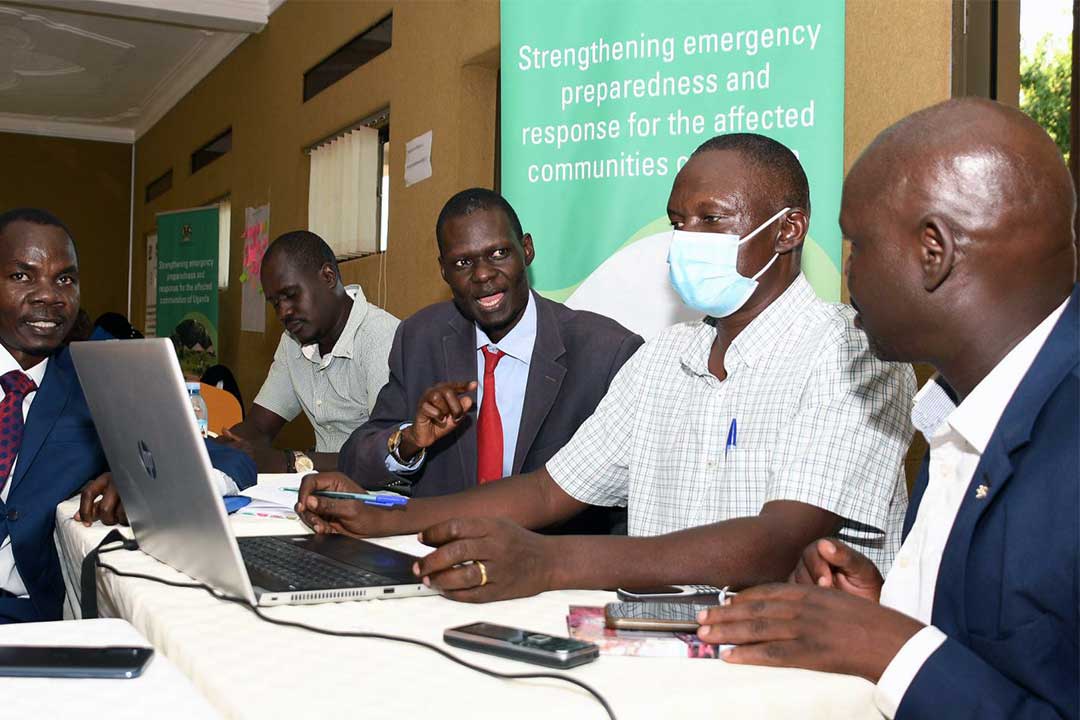Since 2014, the district located in the Lake Kyoga basin has been hit severally by floods, hailstorms, and other hazards that have washed away roads and displaced over 100,000 people. Ironically, the district did not have a contingency plan to boost its disaster preparedness and response interventions until last week when World Vision with financial support from UNICEF organized a four-day training of the district’s top officials. The training was coordinated and supported by OPM.
The training targeted the District Disaster Management Committee members in critical departments such as planning, production, water and sanitation, health, education, community development, social services, works, and finance as part of the capacity-building strategy for district local governments.
Raymond Kirungi, a Disaster Preparedness Officer from the Office of the Prime Minister and lead trainer, stressed the need for a district contingency plan (DCP) as a preparedness and resource mobilization tool for the district.
“The key deliverable from this training was to develop the contingency plan."
"This plan defines not just the roles of each player but also gives the district management the mandate to budget, solicit additional funding, and implement swift response mechanisms that will cushion the vulnerable communities from disasters and hazards that befall them unaware. It was a request from the district leadership that we support them to develop this plan,” he noted.
Among the hazards that Serere District suffers the most are floods, hailstorms, crop destruction, death of livestock, infrastructure destruction such as roads and schools, prolonged dry spells, and pest infestations.
Fresh of the hounds of a desert locust invasion and floods that affected all eight sub-counties, the district is currently battling army worms that are leaving nothing but destruction in their wake.
Gabriel Otiira, Serere District’s Principal Assistant Secretary, confirmed that over 300,000 people in the district were affected by floods in 2021.
“Each sub county and Town Council in Serere was hit by floods last year (2021). The floods also cut off eight major roads, submerged four villages and destroyed four boreholes. Some of the displaced people have been sleeping in classrooms at nearby schools,” Otiira who represented the Chief Administrative Officer (CAO) at the training, added.
With the training of district officials and development of the District Contingency Plan, Otiira is confident that Serere is now better placed to respond to natural and man-made hazards that are forecasted to continue ravaging parts of Uganda, particularly in the Karamoja sub-region.
“The contingency plan will challenge us to direct our resources to core priority areas, look for additional funding through partnerships, and plan for long-term interventions. After learning about the early warning signs and coping mechanisms, the DDMC, which I chair, will not be firefighting as we have been doing in the past. Instead, we shall have the mandate, the resources and technical knowledge to respond to any emerging disasters,” he added.
Besides developing the district contingency plan, the training also covered sexual exploitation and abuse during emergency responses, identification of early warning signs, and multi-sectoral and stakeholder engagement with partners and other opinion leaders.
Hereafter, Serere District has set a target of 19 December 2022 to have validated the contingency plan and tested it through various simulations. The final draft will be passed by the district administration and disseminated to the public by the end of January 2023.
John Bosco Kimuli, UNICEF Uganda’s Water, Sanitation and Hygiene (WASH) Specialist at the Moroto Zonal Office reiterated UNICEF’s commitment to support the district in emergency responses to disasters.
“Emergencies are a key pillar of UNICEF’s interventions. This training aims to strengthen your capacity to timely respond and reduce the impact of disasters on children and their families. We will work with you to achieve this objective,” Kimuli said.
At least 31 officials from Serere District participated in the training at Akello Hotel in Soroti Municipality. Other districts that will benefit from similar training include Amolatar in northern Uganda, Kagadi in western Uganda and Nakasongola.

